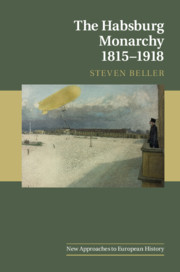Book contents
- Frontmatter
- Contents
- List of Figures
- List of Maps
- Map
- Acknowledgements
- Introduction: Austria and Modernity
- 1 1815–1835: Restoration and Procrastination
- 2 1835–1851: Revolution and Reaction
- 3 1852–1867: Transformation
- 4 1867–1879: Liberalisation
- 5 1879–1897: Nationalisation
- 6 1897–1914: Modernisation
- 7 1914–1918: Self-Destruction
- Conclusion: Central Europe and the Paths Not Taken
- Bibliography
- Index
5 - 1879–1897: Nationalisation
Published online by Cambridge University Press: 25 May 2018
- Frontmatter
- Contents
- List of Figures
- List of Maps
- Map
- Acknowledgements
- Introduction: Austria and Modernity
- 1 1815–1835: Restoration and Procrastination
- 2 1835–1851: Revolution and Reaction
- 3 1852–1867: Transformation
- 4 1867–1879: Liberalisation
- 5 1879–1897: Nationalisation
- 6 1897–1914: Modernisation
- 7 1914–1918: Self-Destruction
- Conclusion: Central Europe and the Paths Not Taken
- Bibliography
- Index
Summary
The end of German Liberal hegemony in the Austrian half of the Monarchy led to a federalist, conservative era that saw the various nationalities within that half gain much more recognition and power. In Hungary, the Magyar Liberal hegemony was strengthened. By 1897, what had been two similar arrangements in both halves looked quite disparate, and were proving politically incompatible. The ongoing crisis set off in 1897 brought the viability of the Monarchy once again into question.
Franz Joseph and conservatives might have thought that by seeing off the German Liberals they could create a new, stable and conservative governmental system in Cisleithania, but new forms of mass politics emerged to complicate and exacerbate the management of the multiethnic and polyglot state. Liberalism was giving way to – or turning into – nationalism as the main form of middle-class politics, but nationalism in turn faced challenges from other mass-political movements: nationalism's radical cousin, racial antisemitism, its culturally conservative rival, Christian Social antisemitism, and the closest heir to liberalism ideologically, Marxian socialism.
By 1897 the developments since 1879 had turned the Monarchy's politics into a witches’ brew, and the disparity between both halves added to the crisis. Yet, as with many crises, the Monarchy was also on the cusp of one of its most culturally fruitful eras, partly because political chaos was only part of the Monarchy's life, and partly as an indirect result of the political chaos.
The Iron Ring
When Taaffe took office as prime minister in August 1879, it was not at all certain that he would survive long in his job. When he began, he did not even have an actual majority in the Reichsrat, as such, and the Liberals were convinced that they, the natural leaders of Austria, would soon be back in power. Yet Taaffe was able to retain power and ran Cisleithania as Franz Joseph's Kaiserminister (emperor's minister) until 1893. His government, soon known as the Iron Ring, completely changed Austrian politics, both decentralising it on national lines on the one hand, and yet strengthening the imperial state bureaucracy's position on the other.
- Type
- Chapter
- Information
- The Habsburg Monarchy 1815–1918 , pp. 160 - 191Publisher: Cambridge University PressPrint publication year: 2018

